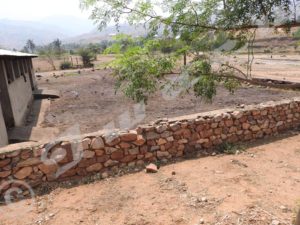The Director of Water Resources says the clandestine abattoir set up along the Mugere River is one of the sources of Lake Tanganyika pollution. The Mugere surrounding inhabitants demand its relocation as it emits unpleasant odor.

15 cows and 20 goats are slaughtered everyday on the bank of Mugere River
When at Mugere River, at 12 Km from Bujumbura city center at 10 a.m., one smells unpleasant odor emanating from a local slaughterhouse located just on the river’s shores, in Kanyosha zone of Muha commune. Flies buzz around the place covered with fresh blood. A flock of crows were gathered together pecking at the remaining waste.
At less than 5 m from the Mugere River banks, one observes traces of fresh blood, cow’s horns and dozens of goat skins. The place has been transformed into an abattoir. There is a house built at 20 m from the river shores, it serves to keep the butchers ‘equipment such as bags, basins, knives and cans. At 5 m from this house, there are three large holes filled with cow dung.
At this time, butchers have already gone to sell meat at various markets in Kanyosha area. “They get up very early in the morning to slaughter goats and cows,” a young woman met at Mugere River Bridge who preferred to remain anonymous told Iwacu.
Residents demand the relocation of the abattoir because of its “nauseating smell”
A slaughterhouse must meet the minimum environmental standards, says a young woman living at 100 m from the Mugere. “An abattoir must necessarily have a tap water. These butchers, who wash meat in the Mugere River, are polluting it, “she said adding that the stench from this abattoir disturbs the surrounding population.” We smell a nauseating odor every morning and evening.
Pierre Sinzotuma, a Kanyosha resident, requests the administrative authorities to relocate the abattoir. “It stinks a lot,” he said before adding that the harmful waste from this slaughterhouse flows into the river. “They pollute the water of the river that we use daily,” he said.
Vital Ndikumana, one of the butchers of Mugere abattoir says they slaughter between 7 and 15 cows and between 10 and 20 goats per day. He admits that their work disturbs and threatens the surrounding inhabitants since it emits a very bad smell. “We work in very difficult conditions. We do not have water and the place is not suitable for a slaughterhouse, “says Ndikumana. He asks the administration to find another place to build a slaughterhouse that meets the minimum hygiene standards. He said that butchers pay BIF 2000 and BIF 1500 for a goat and cow slaughtered each day respectively.
Mugere abattoir, one of the sources of Lake Tanganyika pollution
Emmanuel Ndorimana, the Director General of Water Resources, says the clandestine abattoir along the Mugere River must be relocated. “Blood and other wastes from this abattoir go straight to the Mugere River which flows down into Lake Tanganyika, thus polluting the lake, “Ndorimana says.
He also says a fine of BIF 1,200 000 has been imposed on people who manage the slaughterhouse. He regrets that, they continue to work despite the fine. He also says these last three months, he addressed three correspondences to the administrator of Muha commune requesting him to suspend slaughtering activities along the banks of the Mugere River.
The latter only gave the slaughterhouse officials a formal notice of relocating the abattoir.”We plan to carry out strenuous activities in collaboration with the local authorities to permanently prevent these butchers from working in this place,” said Ndorimana.
In May 2017, the Ministry of Environment, together with the local authorities, destroyed a pigsty near the Kanyosha River. “No activity is allowed to be carried out in this zone,” said Ndorimana. As part of the protection of Lake Tanganyika, all rivers flowing across Bujumbura must be protected from all activities that can pollute them.
Lake Tanganyika is shared among four countries: the DRC, Tanzania, Burundi, and Zambia. It is the second oldest freshwater lake in the world, second largest by volume, and the second deepest, in all cases after Lake Baikal in Siberia.


















 IWACU Open Data
IWACU Open Data

